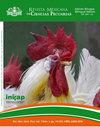利用GWAS分析和相互作用网络分析鉴定与牛性情相关的候选基因和SNP
IF 0.6
4区 农林科学
Q3 AGRICULTURE, DAIRY & ANIMAL SCIENCE
引用次数: 0
摘要
本研究的目的是鉴定安格斯和布兰格斯品种中具有极端气质的动物,以退出速度、基因组区域和与牛气质相关的候选基因为指标。用Genomic Profiler HD 150K芯片对人群进行基因分型,全基因组关联分析发现,snp rs133956611 (P=2.65 E-06)和rs81144933 (P=9.58 E-06)与气质相关。rs81144933位点的定位分析发现,SNCA (α -synuclein)和MMRN1(多聚体蛋白-1)基因分别位于下游222.8和435.9 Kb,而rs133956611位点的GPRIN3 (GPRIN家族成员-3)基因位于上游245.7 Kb,这三个基因都位于BTA6染色体上。SNCA蛋白-蛋白相互作用的分析使得APP (β-淀粉样蛋白前体蛋白)、PARK7(帕金森病相关脱糖酶)、UCHL1(泛素- c末端水解酶- l1)、PARK2(泛素- rbr - e3 -泛素蛋白连接酶)和SLC家族基因被确定为与牛气质相关的候选基因。对所有候选基因及其相互作用进行了重测序,从而在SNCA和APP基因中发现了新的snp。其中,位于APP基因的5、8和11内含子上的snp影响剪接位点基序。这些结果表明,SNCA及其互作基因可能与牛的性情有关。本文章由计算机程序翻译,如有差异,请以英文原文为准。
Identificación de genes candidatos y SNP relacionados con el temperamento del ganado utilizando un análisis GWAS junto con un análisis de redes interactuantes
The objective of this study was to identify in Angus and Brangus breed animals with extreme temperament, measured as exit velocity, genomic regions and candidate genes associated with bovine temperament. The population was genotyped with the Genomic Profiler HD 150K chip and after the genome-wide association analysis, the SNPs rs133956611 (P=2.65 E-06) and rs81144933 (P=9.58 E-06) were associated with temperament. The mapping analysis of the regions close to the SNP rs81144933 identified the SNCA (alpha-synuclein) and MMRN1 (multimerin-1) genes at 222.8 and 435.9 Kb downstream respectively, while for the rs133956611 loci the gene GPRIN3 (GPRIN family-member-3) was identified at 245.7 Kb upstream, all three genes are located on the BTA6 chromosome. The analysis of SNCA protein-protein interactions allowed the identification of the genes APP (β-amyloid precursor protein), PARK7 (parkinsonism-associated-deglycase), UCHL1 (ubiquitin-C-terminal-hydrolase-L1), PARK2 (parkin-RBR- E3-ubiquitin-protein-ligase), and genes of the SLC family as candidates to be associated with bovine temperament. All these candidate genes and their interacting were resequenced, which allowed the discovery of new SNPs in the SNCA and APP genes. Of these, the SNPs located in introns 5, 8 and 11 of the APP gene affect splicing site motifs. These results indicate that SNCA and its interacting genes are candidates to be related to bovine temperament.
求助全文
通过发布文献求助,成功后即可免费获取论文全文。
去求助
来源期刊

Revista Mexicana de Ciencias Pecuarias
AGRICULTURE, DAIRY & ANIMAL SCIENCE-
CiteScore
1.20
自引率
0.00%
发文量
93
审稿时长
>12 weeks
期刊介绍:
The MEXICAN MAGAZINE OF SCIENCES PECUARIAS is an organ of scientific and technical diffusion of the livestock sector. Its periodicity is quarterly and arbitrated by pairs in the double-blind mode. Its objective is to make known the results of the research carried out by any scientific institution, in Mexico and in any part of the world, related to the livestock sciences, particularly those that refer to the different disciplines of Veterinary Medicine and Animal Science. The Journal is bilingual, publishes the complete articles in Spanish or English and is included in various indexing services and international dissemination platforms, such as the Index of Mexican Journals of Scientific and Technological Research of the National Council of Science and Technology (CONACYT); In the EBSCO Host database; In the Network of Scientific Journals of Latin America and the Caribbean, Spain and Portugal (RedALyC); In the Ibero-American Network of Scientific Journals of Free Access Veterinary Medicine. Indexed in the ISI Journal Citation Report Science Edition; And Elsevier''s SCOPUS and EMBASE indices.
 求助内容:
求助内容: 应助结果提醒方式:
应助结果提醒方式:


